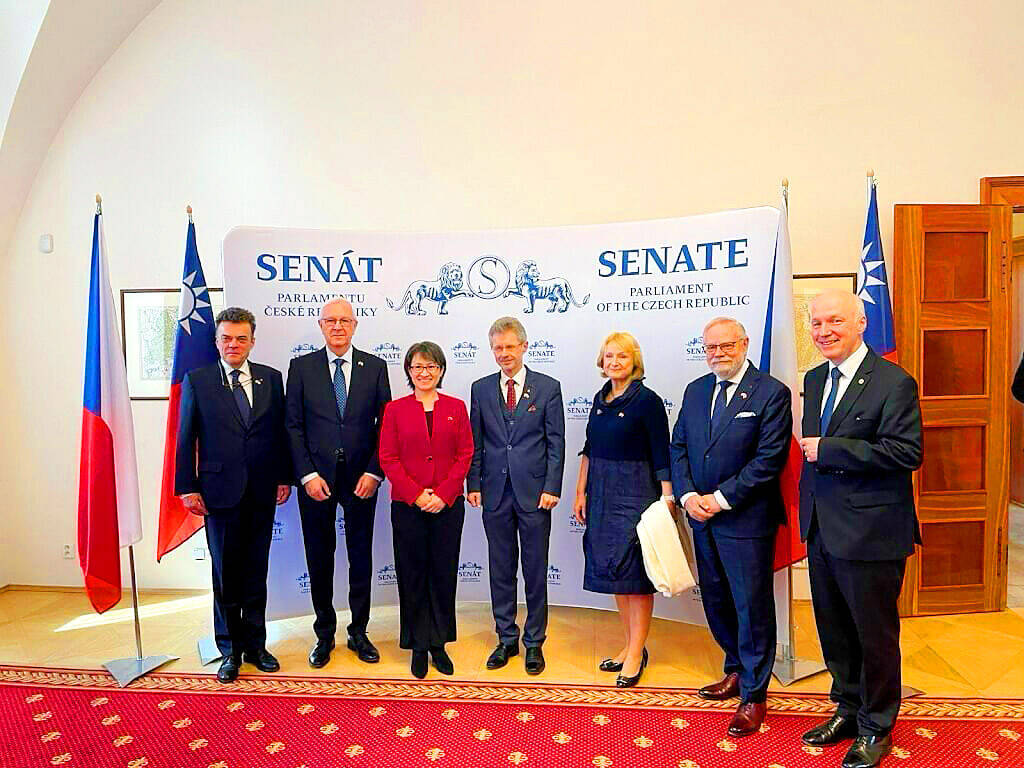Czech officials have confirmed that Chinese agents surveilled Vice President Hsiao Bi-khim (蕭美琴) during her visit to Prague in March 2024 and planned a collision with her car as part of an “unprecedented” provocation by Beijing in Europe.
Czech Military Intelligence learned that their Chinese counterparts attempted to create conditions to carry out a demonstrative incident involving Hsiao, which “did not go beyond the preparation stage,” agency director Petr Bartovsky told Czech Radio in a report yesterday.
In addition, a Chinese diplomat ran a red light to maintain surveillance of the Taiwanese delegation, the report said.

Photo courtesy of the Ministry of Foreign Affairs
These attempts took place during Hsiao’s first overseas trip after she and then President-elect Lai Ching-te (賴清德) won the presidential election but before they were sworn in.
During the visit, Hsiao met and took photos with Czech Senate President Miloš Vystrčil, a meeting said to have angered China.
Local intelligence agents were prepared to intervene if necessary, according to Czech Radio, adding that Hsiao was never in immediate danger.
Jan Pejšek, spokesperson for the Czech Military Intelligence Service, described the Chinese officials’ actions as “bordering on endangering her, gathering information about her schedule, and attempting to document her meetings with prominent figures from the Czech political and public spheres,” according to Czech Radio.
The Chinese embassy “flagrantly violated obligations under the Vienna Convention on Diplomatic Relations,” he added.
The agency said such a provocative attempt was “unprecedented” by China in Europe and the matter was reported to the Czech Ministry of Foreign Affairs.
However, Mariana Wernerova, spokesperson for the Czech Foreign Ministry, told Czech Radio the ministry “cannot comment on the details of this or other similarly sensitive cases,” though they have communicated with the Chinese side on the matter.
The Chinese embassy did not respond to questions submitted by the press.
In response to the report, Presidential Office spokesperson Karen Kuo (郭雅慧) said at a press conference in Taipei on Thursday that Taiwan’s security agencies had full knowledge of the intelligence at the time. She also expressed gratitude to the Czech Republic for its strong support and the professional protection provided during Hsiao’s visit.
Kuo added that Taiwan strongly condemns China’s unlawful actions, which violate international norms and pose serious risks to the international community.

Conflict with Taiwan could leave China with “massive economic disruption, catastrophic military losses, significant social unrest, and devastating sanctions,” a US think tank said in a report released on Monday. The German Marshall Fund released a report titled If China Attacks Taiwan: The Consequences for China of “Minor Conflict” and “Major War” Scenarios. The report details the “massive” economic, military, social and international costs to China in the event of a minor conflict or major war with Taiwan, estimating that the Chinese People’s Liberation Army (PLA) could sustain losses of more than half of its active-duty ground forces, including 100,000 troops. Understanding Chinese

The Ministry of Foreign Affairs (MOFA) yesterday said it is closely monitoring developments in Venezuela, and would continue to cooperate with democratic allies and work together for regional and global security, stability, and prosperity. The remarks came after the US on Saturday launched a series of airstrikes in Venezuela and kidnapped Venezuelan President Nicolas Maduro, who was later flown to New York along with his wife. The pair face US charges related to drug trafficking and alleged cooperation with gangs designated as terrorist organizations. Maduro has denied the allegations. The ministry said that it is closely monitoring the political and economic situation

UNRELENTING: China attempted cyberattacks on Taiwan’s critical infrastructure 2.63 million times per day last year, up from 1.23 million in 2023, the NSB said China’s cyberarmy has long engaged in cyberattacks against Taiwan’s critical infrastructure, employing diverse and evolving tactics, the National Security Bureau (NSB) said yesterday, adding that cyberattacks on critical energy infrastructure last year increased 10-fold compared with the previous year. The NSB yesterday released a report titled Analysis on China’s Cyber Threats to Taiwan’s Critical Infrastructure in 2025, outlining the number of cyberattacks, major tactics and hacker groups. Taiwan’s national intelligence community identified a large number of cybersecurity incidents last year, the bureau said in a statement. China’s cyberarmy last year launched an average of 2.63 million intrusion attempts per day targeting Taiwan’s critical

AGING: As of last month, people aged 65 or older accounted for 20.06 percent of the total population and the number of couples who got married fell by 18,685 from 2024 Taiwan has surpassed South Korea as the country least willing to have children, with an annual crude birthrate of 4.62 per 1,000 people, Ministry of the Interior data showed yesterday. The nation was previously ranked the second-lowest country in terms of total fertility rate, or the average number of children a woman has in her lifetime. However, South Korea’s fertility rate began to recover from 2023, with total fertility rate rising from 0.72 and estimated to reach 0.82 to 0.85 by last year, and the crude birthrate projected at 6.7 per 1,000 people. Japan’s crude birthrate was projected to fall below six,